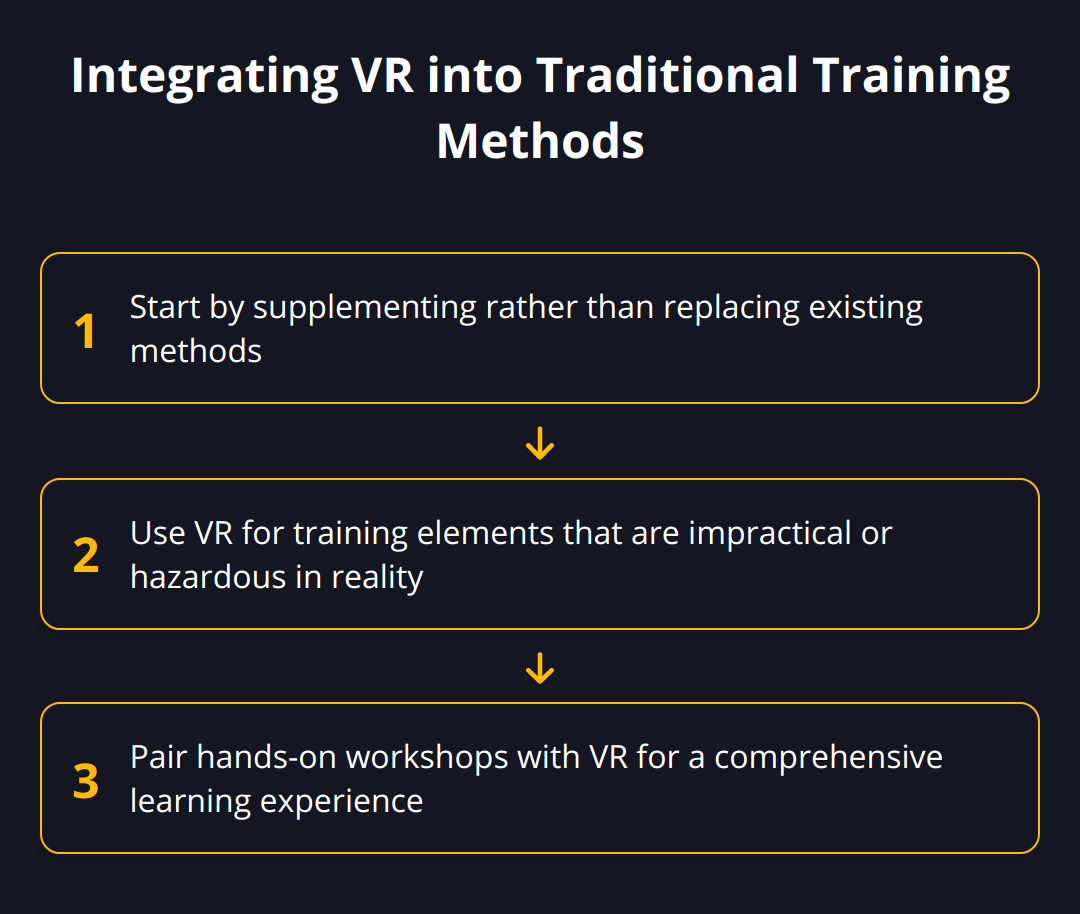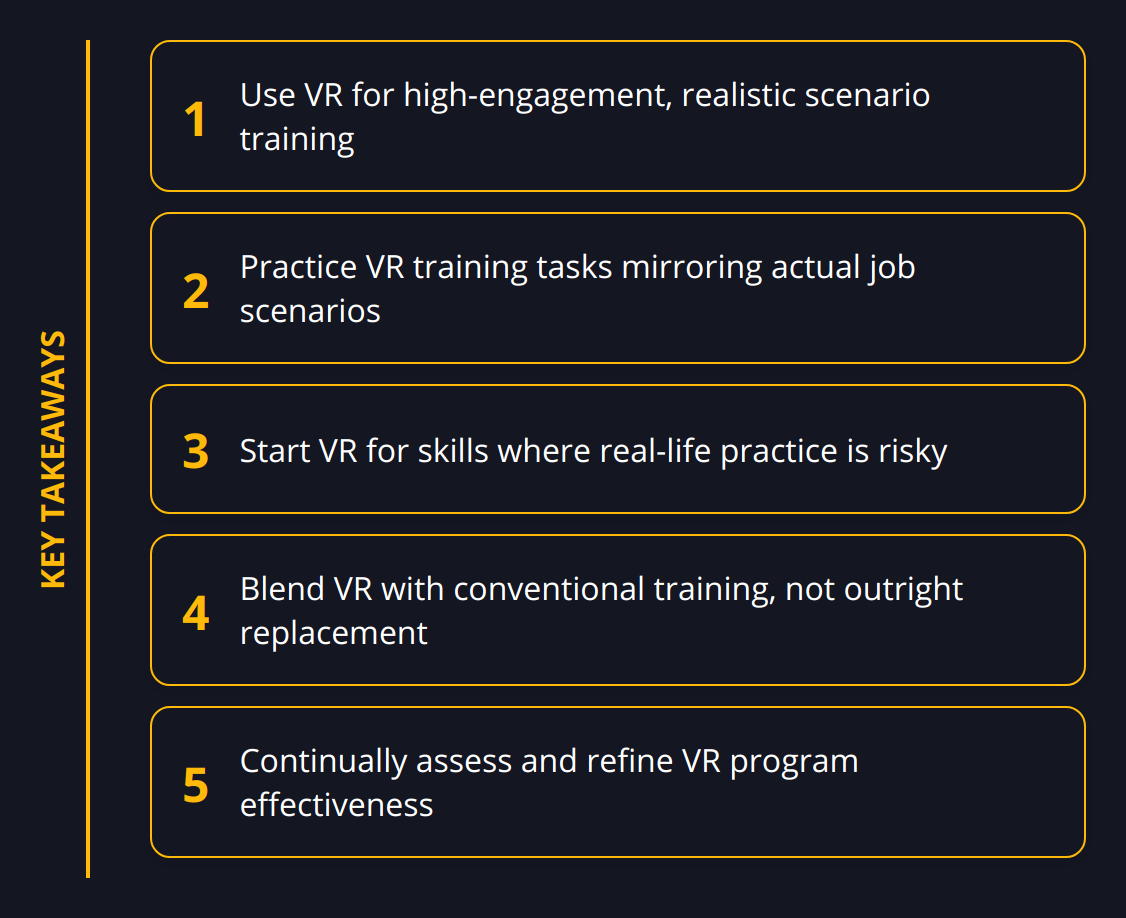We at Newroom Connect have observed a significant shift in the landscape of corporate training. Virtual Reality (VR) workshops are rapidly emerging as a powerful tool for professional development. They offer immersive, interactive learning experiences that traditional methods can’t match. In the following paragraphs, we’ll explore the tangible benefits of VR in the corporate training sphere and how organizations can seamlessly integrate this technology into their existing programs.
Elevating Corporate Training with VR
The rise of Virtual Reality (VR) workshops as a core strategy for corporate training is more than a fleeting trend. It’s a game-changer for industries aiming to enhance their employee training programs with efficiency and impact. Here are the specific benefits that VR workshops bring to the table when it comes to corporate training.
Engagement That Powers Learning
With VR, learners are thrust into highly engaging, realistic scenarios that demand their full attention — a stark contrast to the often passive nature of traditional learning methods. This participatory learning environment leads to higher retention rates. For instance, PwC’s VR Soft Skills Training study shows an impressive 75% increase in emotional connections to content compared to e-learning.

Risk-Free Realism
A standout advantage of VR is the ability to practice skills in a risk-free setting. This is invaluable for roles where real-life training can have high stakes, such as healthcare or heavy machinery operation. For example, surgeons trained with VR have been shown to make 40% fewer errors than their non-VR trained counterparts.
Scaling Success Without Escalating Costs
When it comes to scalability and cost-effectiveness, VR workshops excel. Once developed, a VR training program can be replicated across an organization with minimal additional costs. With VR becoming more affordable, comprehensive, and accessible, companies no longer face prohibitive barriers to entry. In fact, VR training cost-effectiveness begins at around 375 users, with growing returns as more practitioners utilize the system.

In current practice, these benefits are changing the landscape of corporate training:
-
Increased learning engagement with immersive VR experiences
-
Reduction of training costs for large-scale implementation
-
Improved safety and risk management in skills acquisition
Tapping into the potential of VR for corporate training allows companies to surpass traditional learning boundaries. The sheer versatility of VR makes it adaptable to virtually any skill set—from soft skills like customer service to complex technical procedures in aerospace. VR training is not just an emerging trend; it’s becoming a cornerstone of future-ready corporate learning strategies.
Maximizing Knowledge Retention with VR
Virtual reality workshops are proving their worth by significantly boosting knowledge retention and enhancing performance among employees. This leap in learning effectiveness is not surprising, given VR’s immersive nature. When employees learn by doing, they retain information longer and can recall it more accurately when it counts – on the job.
Enhanced Memory Recall and Retention
Realistic environments and scenarios created in virtual workshops help foster a connection between theory and practice. Studies suggest that immersive VR learning experiences can improve recall by up to 8-10% over traditional methods. This could be because VR engages several senses at once, creating stronger memory traces in the learner’s brain.

Furthermore, by incorporating practice sessions in these VR settings, employees can repeatedly interact with the subject matter. This repetition cements the information, making it readily accessible when needed in a real-world context.
Real-World Application and Muscle Memory Development
The power of VR is in its ability to mimic real-life situations without the associated risks. When learners repeatedly perform tasks in a virtual environment, they’re not just understanding the procedure; they’re developing muscle memory. For instance, a study by PwC’s VR Soft Skills Training found that employees trained in VR programs are better prepared to execute physical tasks in real-world settings.
Moreover, as participants navigate through a VR simulation, they’re also honing their decision-making and problem-solving skills, which are crucial in dynamic work environments.
Measurable Improvement in Employee Performance
Beyond the subjective sense of increased competence, VR training offers measurable performance improvements. According to data from the VR training company STRIVR, learners trained in VR show a significant uptick in performance quality. This data reinforces the connection between VR training and enhanced on-the-job performance.
Organizations can track these performance metrics through advanced VR analytics, using them to refine training programs continually. Through detailed feedback loops and performance analytics, VR doesn’t just train employees; it provides a clear pathway to ongoing improvement.

Here are some actionable points to consider when implementing VR workshops:
-
Invest in creating detailed, realistic simulations.
-
Ensure practice tasks in VR correlate as closely as possible to real-world scenarios.
-
Use VR to target skill areas critical for job performance.
-
Implement consistent and regular training intervals to boost muscle memory.
Remember, VR is more than a buzzword; it’s an investment in employee capability and confidence. When used effectively, VR can be the catalyst for a highly skilled and agile workforce, equipped to meet the challenges of an evolving corporate landscape.
How to Seamlessly Blend VR into Corporate Training
Virtual reality is transforming the corporate training landscape, but success hinges on thoughtful integration. Companies looking to upgrade their training programs should focus on areas where VR can make the most significant impact. Identifying crucial skills that benefit from simulation—such as emergency response, technical equipment operation, or complex problem-solving—can pave the way for a more productive VR training experience.

Measuring Success and Gathering Feedback is imperative to refine VR training over time. Performance metrics and feedback can guide program adjustments, ensuring the training remains relevant and effective. Evaluating knowledge retention and real-world task performance before and after VR training sessions provides insight into the effectiveness of the VR components.
Actionable Tips for Successful VR Training Integration:
-
Map out skills and scenarios best suited for VR.
-
Combine VR with traditional hands-on training for a holistic approach.
-
Employ pre- and post-training assessments to gauge effectiveness.
-
Collect detailed feedback from participants for continuous improvement.
By fostering skills in a simulated yet impactful environment, VR workshops can bridge the gap between theoretical learning and real-world application. The goal isn’t to overthrow traditional methods but to enrich them, creating a multifaceted training program that’s both cutting-edge and grounded in practicality. With the right strategy, your company can harness the power of VR to build a future-ready workforce.
Wrapping Up
The strategic advantages of Virtual Reality in corporate training are clear and compelling. VR workshops offer unparalleled engagement, a safe environment for risk-free practice, and scalable solutions that keep costs in check. What sets these workshops apart is their ability to immerse learners in realistic scenarios that not only enhance learning outcomes but also prepare them to perform more effectively in their roles.

We at Newroom Connect firmly believe that the time to adopt VR workshops is now. By leveraging these immersive tools, businesses can provide cutting-edge training that resonates with employees, thereby fostering a well-equipped workforce. As an organization that specializes in creating virtual platforms, our offerings can help companies transition smoothly to these innovative training methods.
To underscore the future potential of VR in professional development, look no further than the growing adoption rates across industries. Companies are realizing that an investment in VR workshops is an investment in their most valuable asset: their people. With VR, the boundaries of corporate training are expanding, allowing professionals to not just learn but also to experience and apply their knowledge in ways never before possible.
For businesses ready to enhance their training programs and explore the immersive world of VR, Newroom Connect is your partner in this journey. Our expertise in developing virtual trade fairs, virtual showrooms, and e-learning platforms ensure that your company stays ahead of the curve in the digital age.
In conclusion, VR workshops represent the next frontier in corporate training. They empower organizations to:
-
Foster deep engagement and retention
-
Provide safe, realistic practice environments
-
Scale up training without escalating costs
-
Offer measurable improvements in performance
The future of VR in professional development shines bright, with the promise of continual advancements and even greater integration into the fabric of corporate learning. We at Newroom Connect are excited to support businesses in unlocking the full potential of these transformative experiences. Visit our website to learn more about how we can assist you in adopting VR workshops, enhancing your corporate training, and building a future-ready workforce.


